六年级英语总复习资料 知识点
英语六年级全册的知识点

英语六年级全册的知识点英语六年级全册的知识点主要包括语法、词汇和表达等方面。
下面将依次介绍六年级英语全册中的主要知识点。
一、语法知识点1. 一般现在时:表示经常性、习惯性的动作或客观真理,构成:主语 + 动词原形。
如:I often play football with my friends.2. 现在进行时:表示现在正在进行的动作,构成:主语 +am/is/are + 现在分词。
如:He is watching TV now.3. 一般过去时:表示过去发生的动作或状态,构成:主语 + 动词过去式。
如:We visited our grandparents last week.4. 一般将来时:表示将来要发生的动作,构成:主语 +will/shall + 动词原形。
如:They will go to the zoo tomorrow.5. 祈使句:表示命令、建议等,构成:动词原形 + 其他。
如:Open the window, please.二、词汇知识点1. 数字:学习英语数字的读写和运用,包括基础的数字、序数词等。
如:one, two, three...;first, second, third...2. 时钟时间:学会询问和表达时间的基本词汇和表达方式。
如:What time is it? It's nine o'clock.3. 季节和天气:学会询问和描述季节和天气的词汇和句子。
如:What's the weather like today? It's sunny.4. 家庭成员:学习家庭成员的词汇,包括父母、兄弟姐妹等。
如:father, mother, brother, sister...5. 动物和植物:学习各种动物和植物的英文名称,扩充词汇量。
如:cat, dog, flower, tree...三、表达知识点1. 问路和指示方向:学会询问和指示方向的基本表达方式。
六年级英文必考知识点归纳

六年级英文必考知识点归纳六年级英文必考知识点涵盖了语法、词汇和阅读理解等多个方面,对于学生来说,掌握这些知识点是非常重要的。
下面是对六年级英文必考知识点的归纳总结。
语法知识点:1. 时态:掌握一般现在时、一般过去时和一般将来时的用法。
例如:I eat breakfast every morning.2. 宾语从句:了解宾语从句在句子中的作用和构成方式。
例如:She said that she was tired.3. 直接引语和间接引语:了解直接引语和间接引语的转换规则,熟练运用引号的用法。
例如:He said, "I'm going to the park." → He said that he was going to the park.4. 疑问句:了解疑问句的构成方式和回答方式。
例如:What is your name? My name is Tom.5. 倒装句:掌握肯定句倒装和否定句倒装的规则。
例如:Never have I seen such a beautiful sunset.词汇知识点:1. 动词短语:掌握常用的动词短语,如:get up, go on, look for 等。
2. 时态词汇:掌握表示时间的词汇,如:yesterday, tomorrow, next week等。
3. 同义词和反义词:了解常见的同义词和反义词,如:happy - glad, good - bad等。
4. 形容词和形容词比较级:掌握形容词的基本用法和比较级的构成方式。
例如:big - bigger, good - better等。
5. 数词和序数词:了解基数词和序数词的用法,如:one, first, two, second等。
阅读理解知识点:1. 主旨大意:能够通过阅读短文,抓住文章的主旨和大意。
2. 细节理解:能够根据短文的内容,回答关于细节的问题。
3. 推理判断:能够根据已有信息进行推理,并作出合理的判断。
(完整版)六年级英语语法知识点汇总

六年级语法总复习亠、词汇(一)一般过去时态一般过去时态表示在过去的某个时间发生的动作或存在的状态,常和表示过去的时间状语连用。
例如yesterday, last weeke nd ,last Saturday , 等连用。
基本句型:主语+动词的过去式+其他。
例句---------- What did youdo last weekend? 你上周做什么了?---- I played football last weeke nd. 我踢足球了。
★规则动词过去式的构成1. 一般在动词原形末尾加-ed。
例如:play —played2. 词尾是e的动词直接加-d。
例如:dance —da need3. 末尾只有一个辅音字母的重读闭音节词,先双写这个辅音字母,再加-ed。
例如stop (停止)--stopped4. 结尾是“辅音字母+y ”的动词,变“ y”为“ i”,再加-ed,例如:study-studied★ 一些不规则变化的动词过去式am/is —was are —were go -—went swim-—swamfly —flew do —did have —had say —-saidsee—sawtake —took come —came become —became get—got draw—drew hurt—-hurtread —read tell —told will—would eat — ate take —took make —made drink —drank sleep(睡觉)—slept cut (切)--cut sit(坐)—satbegin(开始)—began th ink —thought find —found run(跑)---ra n buy —bought win -—won give(给)—gave sing —sang leave —left hear (听)--heart wear ——wore(二)一般现在时态一般现在时态表示包括现在时间在内的一段时间内经常发生的动作或存在的状态,表示习惯性或客观存在的事实和真理。
六年级英语知识点提纲
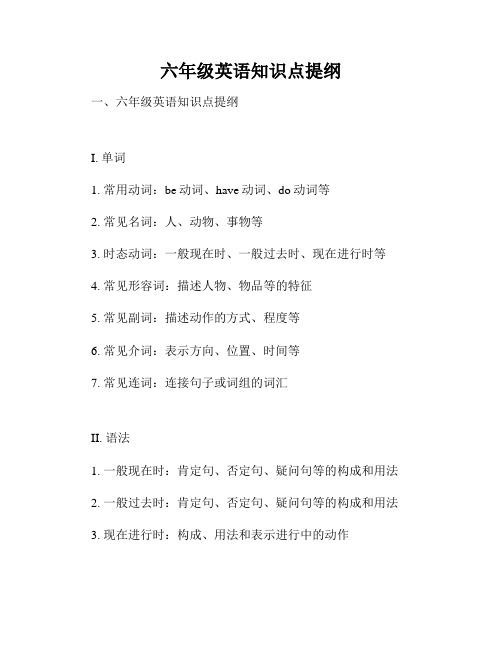
六年级英语知识点提纲一、六年级英语知识点提纲I. 单词1. 常用动词:be动词、have动词、do动词等2. 常见名词:人、动物、事物等3. 时态动词:一般现在时、一般过去时、现在进行时等4. 常见形容词:描述人物、物品等的特征5. 常见副词:描述动作的方式、程度等6. 常见介词:表示方向、位置、时间等7. 常见连词:连接句子或词组的词汇II. 语法1. 一般现在时:肯定句、否定句、疑问句等的构成和用法2. 一般过去时:肯定句、否定句、疑问句等的构成和用法3. 现在进行时:构成、用法和表示进行中的动作4. 比较级和最高级:形容词的比较级和最高级形式的构成和用法5. 名词所有格:表示所有关系的名词的构成和用法6. 介词短语:表示时间、地点、原因等的介词短语的使用7. 人称代词:主格和宾格的用法及其在句子中的作用III. 句型1. There be句型:表示事物存在的句型构成和用法2. 简单句:主语+谓语+宾语的句子构成3. 并列句:两个或多个简单句并列构成的句子4. 复合句:主句和从句构成的句子IV. 阅读理解1. 短文阅读:理解短文的主旨、大意以及具体细节2. 根据短文回答问题:根据短文内容回答问题3. 补全对话:根据对话的语境选择正确的选项V. 写作1. 句子写作:根据所学的语法知识编写正确的句子2. 简单段落写作:组织句子和观点,写一段简短的小作文VI. 听力1. 听力材料:听懂日常对话和简短故事2. 根据听到的内容回答问题:根据听到的对话或短文回答问题3. 听写:听写所听到的单词、句子或短文VII.口语1. 日常用语:问候、道歉、感谢、请求等常用表达方式2. 简单对话:根据给定情境进行简单的日常对话练习以上是六年级英语的知识点提纲,通过学习以上内容,能够更好地掌握英语的基础知识,提高听说读写能力。
请学生们按照教师的指导和布置的任务进行学习和练习,以便更好地应对即将到来的考试和实际运用中遇到的问题。
六年级英语总复习资料内容
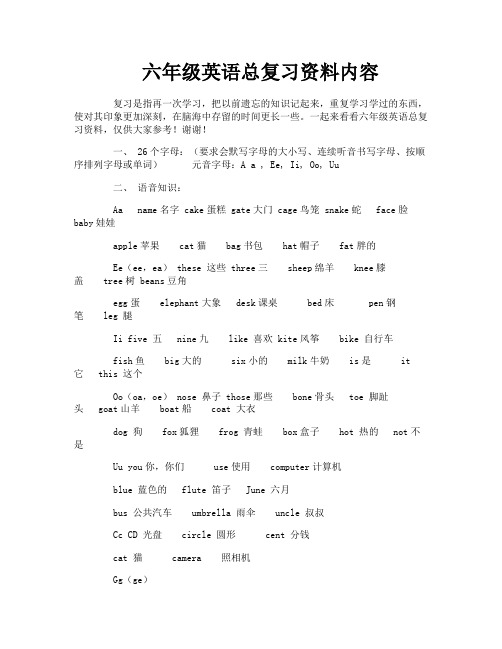
六年级英语总复习资料内容复习是指再一次学习,把以前遗忘的知识记起来,重复学习学过的东西,使对其印象更加深刻,在脑海中存留的时间更长一些。
一起来看看六年级英语总复习资料,仅供大家参考!谢谢!一、 26个字母:(要求会默写字母的大小写、连续听音书写字母、按顺序排列字母或单词)元音字母:A a , Ee, Ii, Oo, Uu二、语音知识:Aa name名字 cake蛋糕 gate大门 cage鸟笼 snake蛇face脸baby娃娃apple苹果 cat猫 bag书包 hat帽子 fat胖的Ee(ee,ea) these 这些 three三 sheep绵羊 knee膝盖 tree树 beans豆角egg蛋 elephant大象desk课桌bed床 pen钢笔 leg 腿Ii five 五nine九 like 喜欢 kite风筝 bike 自行车fish鱼 big大的six小的 milk牛奶 is是it它this 这个Oo(oa,oe) nose 鼻子 those那些 bone骨头toe 脚趾头goat山羊 boat船 coat 大衣dog 狗 fox狐狸 frog 青蛙 box盒子 hot 热的not不是Uu you你,你们use使用 computer计算机blue 蓝色的flute 笛子June 六月bus 公共汽车 umbrella 雨伞 uncle 叔叔Cc CD 光盘 circle 圆形cent 分钱cat 猫camera 照相机Gg(ge)orange 桔子 giraffe 长颈鹿page 页frog 青蛙 girl 女孩big 大的gate 大门th thin 瘦的 three 三thirteen 十三mouth 嘴mother 妈妈 father 爸爸 brother 兄弟 they 他们this 这个 that 那个feather 羽毛whwhat 什么 when 什么时候where 哪里why 为什么which 哪一个white 白色的water水 woman 女人walk 走who 谁whose 谁的ar car 汽车park 公园farm 农场arm手臂 star星星ir girl 女孩bird 鸟nurse护士purse 钱包 turtle 海龟third第三hurt 疼ow cow奶牛owl 猫头鹰house 房子mouse 鼠,鼠标cloudy 多云的oyoi boy 男孩 toy 玩具 oyster 贝壳oil 油coin 硬币 boil 沸腾oroor horse 马 store 商店 corn 玉米door 门floor 地板airear chair 椅子hair 头发 pear 梨bear 熊oobook 书 good 好的 look 看 foot 脚moon 月亮 food 食物pool 池子 room房间字母s或es的发音:字母s在词首发音为/s/, 在中间如:usually, television, treasure, casual中发音为/ /;以/p/, /t/, /k/ 清音收尾,读音为/s/;其他情况一般读音为/z/;以s, x, ch, sh 收尾加es的,es读音为/iz/。
六年级英语全部知识点

六年级英语全部知识点一、基础语法知识1. 词性及词类转换:名词、动词、形容词、副词、代词、介词、冠词等。
2. 句子成分:主语、谓语、宾语、定语、状语等。
3. 时态和语态:一般现在时、一般过去时、一般将来时、被动语态等。
4. 比较级和最高级:形容词和副词的比较级和最高级形式及用法。
5. 直接引语和间接引语:使用和转换直接引语和间接引语。
6. 疑问句和否定句:构成和变换疑问句和否定句。
7. 句型转换:选择适当的句型进行句子转换。
二、词汇与短语1. 常用单词:认读和拼写常见单词,包括名词、动词、形容词、副词等。
2. 词组和短语:学习常用的固定搭配和日常用语表达。
3. 同义词和反义词:学习常见词语的同义词和反义词。
三、阅读理解1. 短文理解:阅读短文,回答问题或完成相关任务。
2. 阅读策略:使用不同的阅读策略,如预测、推理、细节获取等。
3. 阅读技巧:学习如何快速定位信息,并理解文章的主旨和要点。
四、写作技巧1. 句子构造:运用所学的语法知识构造完整的句子。
2. 选择恰当的词汇:根据语境选择合适的词汇。
3. 写作规范:注意句子结构和标点符号的使用。
4. 表达观点:用简洁明了的语言表达自己的观点和意见。
五、口语表达1. 日常用语:学习基本的问候和日常用语表达。
2. 对话交流:练习进行简单的对话和交流。
3. 角色扮演:模拟真实场景,进行角色扮演对话。
六、听力技巧1. 听懂关键信息:提高听力理解能力,抓住关键信息。
2. 根据所听内容回答问题:通过听力材料回答问题或完成相关任务。
3. 跟读练习:提高发音和语调,跟读所听内容。
七、语法综合运用1. 完形填空:根据上下文语境,选择合适的词汇填空。
2. 语法填空:根据所给的语法规则和句子结构,填写正确的词语。
3. 句型转换:根据提示,将句子进行结构转换。
4. 语法错误改正:找出句子中的语法错误,并进行修改。
八、语言知识运用1. 单句翻译:将中文句子翻译成英文,或将英文句子翻译成中文。
最新小学六年级英语总复习资料
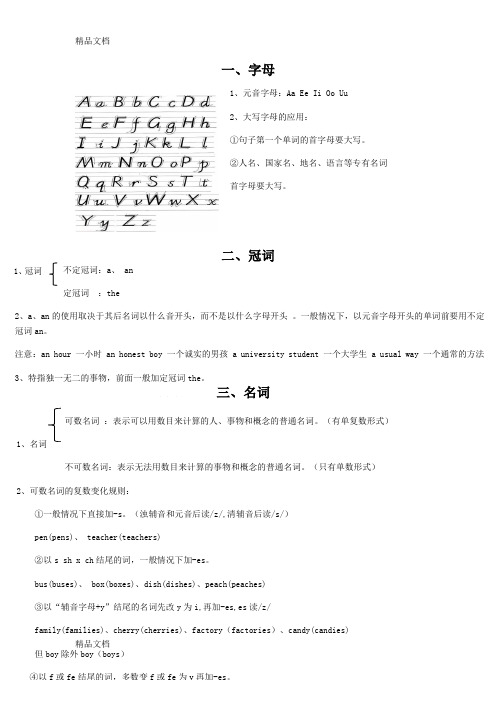
一、字母二、冠词1、元音字母:Aa Ee Ii Oo Uu2、大写字母的应用:①句子第一个单词的首字母要大写。
②人名、国家名、地名、语言等专有名词 首字母要大写。
不定冠词:a 、 an 定冠词 :the2、a 、an 的使用取决于其后名词以什么音开头,而不是以什么字母开头 。
一般情况下,以元音字母开头的单词前要用不定冠词an 。
注意:an hour 一小时 an honest boy 一个诚实的男孩 a university student 一个大学生 a usual way 一个通常的方法 3、特指独一无二的事物,前面一般加定冠词the 。
Eg:The Great Wall is in China.长城在中国。
三、名词可数名词 :表示可以用数目来计算的人、事物和概念的普通名词。
(有单复数形式) 1、名词不可数名词:表示无法用数目来计算的事物和概念的普通名词。
(只有单数形式) 2、可数名词的复数变化规则:①一般情况下直接加-s 。
(浊辅音和元音后读/z/,清辅音后读/s/) pen(pens)、 teacher(teachers)②以s sh x ch 结尾的词,一般情况下加-es 。
bus(buses)、 box(boxes)、dish(dishes)、peach(peaches) ③以“辅音字母+y ”结尾的名词先改y 为i,再加-es,es 读/z/family(families)、cherry(cherries)、factory (factories )、candy(candies)四、代词(一) 人称代词 物主代词 反身代词 主格 宾格 形容词性 名词性单数 I me my mine myself 第一人称复数 we us our ours ourselves 单数 yourself 第二人称 you you your yours复数 yourselves he him his his himself单数 she her her hers herself第三人称 it it its its itself 复数 they them their theirs themselves1、形容词性物主代词后可加名词,名词性物主代词后不可加名词。
六年级英语笔记知识点
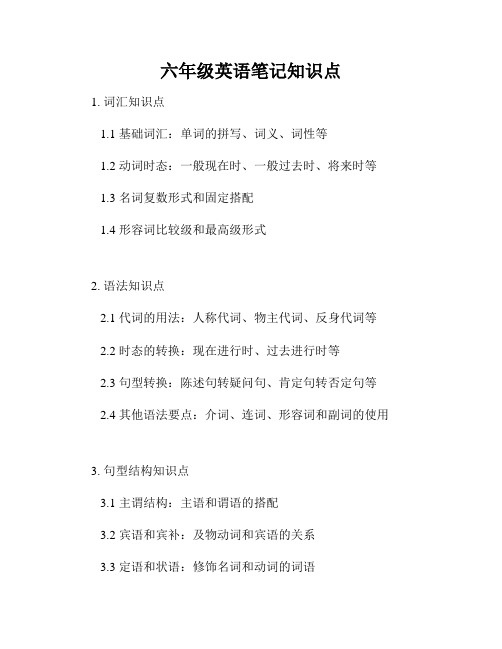
六年级英语笔记知识点
1. 词汇知识点
1.1 基础词汇:单词的拼写、词义、词性等
1.2 动词时态:一般现在时、一般过去时、将来时等 1.3 名词复数形式和固定搭配
1.4 形容词比较级和最高级形式
2. 语法知识点
2.1 代词的用法:人称代词、物主代词、反身代词等 2.2 时态的转换:现在进行时、过去进行时等
2.3 句型转换:陈述句转疑问句、肯定句转否定句等 2.4 其他语法要点:介词、连词、形容词和副词的使用
3. 句型结构知识点
3.1 主谓结构:主语和谓语的搭配
3.2 宾语和宾补:及物动词和宾语的关系
3.3 定语和状语:修饰名词和动词的词语
3.4 状语从句和定语从句:引导词和从句的语序
4. 阅读技巧和理解
4.1 阅读速度与准确性的平衡
4.2 找出关键词和主题句
4.3 掌握不同类型文章的结构和特点
4.4 分析文章中的信息和细节
5. 写作技巧
5.1 写作结构:开头、中间段落和结尾的组织 5.2 使用适当的过渡词和连接词
5.3 表达清晰的观点和理由
5.4 检查和修正语法和拼写错误
6. 口语表达
6.1 学习正确的发音和语调
6.2 练习日常对话和演讲技巧
6.3 提高听力理解和对话回应能力
6.4 学习常用口语短语和惯用表达方式
以上是六年级英语笔记的主要知识点,通过学习和掌握这些内容,可以帮助你在英语学习中取得更好的成绩。
记得多加练习和阅读,不断提升自己的语言能力。
祝你学习愉快!。
六年级英语毕业重要知识点

六年级英语毕业重要知识点六年级的英语学习是小学生阶段学习英语的最后一年,掌握好六年级英语的重要知识点对于学生接下来的学习有着重要的影响。
下面将介绍六年级英语的重要知识点,帮助学生整理复习和备考。
一、基础语法知识1. 时态:六年级英语学习的重要知识点之一是时态,包括一般现在时、一般过去时以及一般将来时等。
学生需要掌握各种时态的构成规则以及常见的句型用法。
2. 代词:代词在英语中起到替代名词的作用,六年级英语学习中重要的代词有人称代词、物主代词、反身代词等。
学生需要熟悉各类代词的用法,能够正确使用代词替代名词。
3. 介词:介词在句子中起到连接作用,表示时间、地点、方式和原因等关系。
学生需要熟记常用的介词及其相关搭配,能够准确地使用介词。
二、阅读理解1. 短文理解:六年级英语学习中,阅读理解是重要部分。
学生需要能够从短文中获取关键信息,理解文章大意,回答相关问题。
训练学生的阅读理解能力对于提高英语综合运用能力很有帮助。
2. 阅读技巧:除了理解短文的内容,学生还需要学会一些阅读技巧,例如根据上下文推测词义、主题句定位等。
这些技巧能够帮助学生更好地理解文章,提高阅读效率。
三、词汇和拼写1. 词汇积累:六年级学生需要掌握一定量的词汇,包括动词、名词、形容词、副词等。
学生可以通过词汇卡片、词汇表等方式进行词汇积累和记忆。
2. 拼写能力:正确拼写是英语学习中的基本要求。
学生需要掌握常见的单词拼写规则,加强拼写训练,提高拼写能力。
四、口语表达1. 句型练习:学生需要通过各类口语练习,掌握常用的表达方式和句型,提高口语表达能力。
2. 对话训练:通过对话练习,学生可以学会询问和回答常见问题,提高与他人进行英语对话的能力。
五、听力训练1. 听力材料:学生需要进行大量的听力训练,熟悉不同场景下的听力材料,提高听力理解能力。
2. 听力技巧:学生需要学习一些听力技巧,例如听前先预测、边听边记笔记等,有助于提高听力效果。
综上所述,六年级英语毕业重要的知识点涉及基础语法、阅读理解、词汇和拼写、口语表达以及听力训练等多个方面。
小学六年级英语最全知识点

小学六年级英语最全知识点一、词汇知识1. 单词拼写:熟练掌握课本中的单词拼写,如人称代词、动词过去式、形容词、副词等。
2. 同义词与反义词:了解一些常见单词的同义词和反义词,提升词汇量和表达能力。
3. 词组搭配:学习常见的固定搭配词组,如"take a walk","have a good time"等。
4. 多义词辨析:学会根据上下文语境理解单词的不同含义。
二、语法知识1. 时态:掌握一般现在时、一般过去时、现在进行时的用法,能正确运用于句子中。
2. 疑问句与否定句:了解疑问句和否定句的构成方式,能够正确转换陈述句为疑问句或否定句。
3. 代词:学习人称代词、物主代词、指示代词等的用法,能正确使用代词替代名词。
4. 句型转换:掌握句型之间的转换,如陈述句和祈使句的转换,肯定句和否定句的转换等。
三、阅读理解1. 理解短文:通过阅读短文,能够准确把握文章的主旨和大意。
2. 查找细节:能够从文章中找到相关的细节信息,并回答问题。
3. 推理判断:根据已有的信息和上下文暗示,能够进行逻辑推理和判断。
4. 阅读表格和图表:能够理解并提取表格和图表中的信息,如时间、地点、人物关系等。
四、听力技巧1. 听力理解:通过听录音材料,能够准确理解所听到的对话或短文内容,答好相关问题。
2. 注意听关键词:在听力中注意捕捉关键词,有助于理解和记忆所听到的内容。
3. 提前预测:在听对话或短文时,提前预测可能出现的问题和答案,有助于更好地理解听力材料。
4. 多听多练:多进行听力练习,提高听力技巧和速度。
五、口语表达1. 口语对话:模仿对话练习,提高口语表达能力,增加常用口语表达的使用频率。
2. 角色扮演:通过角色扮演的形式,练习日常会话和交际中常见的情景对话。
3. 想象对话:利用想象力编写和进行对话,提升口语表达的流利程度。
4. 演讲训练:锻炼口头表达能力,培养逻辑思维和自信心。
六、写作技巧1. 句子连贯:注意句子之间的衔接,使用适当的过渡词和短语,使句子间关系更加紧密。
六年级英语必背知识点
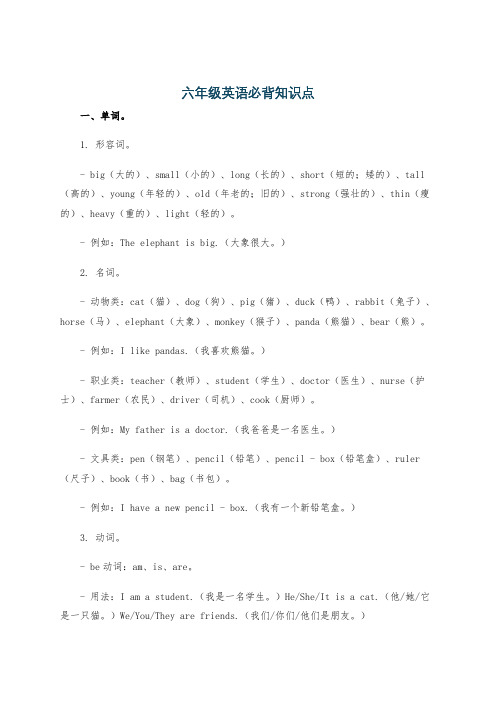
六年级英语必背知识点一、单词。
1. 形容词。
- big(大的)、small(小的)、long(长的)、short(短的;矮的)、tall (高的)、young(年轻的)、old(年老的;旧的)、strong(强壮的)、thin(瘦的)、heavy(重的)、light(轻的)。
- 例如:The elephant is big.(大象很大。
)2. 名词。
- 动物类:cat(猫)、dog(狗)、pig(猪)、duck(鸭)、rabbit(兔子)、horse(马)、elephant(大象)、monkey(猴子)、panda(熊猫)、bear(熊)。
- 例如:I like pandas.(我喜欢熊猫。
)- 职业类:teacher(教师)、student(学生)、doctor(医生)、nurse(护士)、farmer(农民)、driver(司机)、cook(厨师)。
- 例如:My father is a doctor.(我爸爸是一名医生。
)- 文具类:pen(钢笔)、pencil(铅笔)、pencil - box(铅笔盒)、ruler (尺子)、book(书)、bag(书包)。
- 例如:I have a new pencil - box.(我有一个新铅笔盒。
)3. 动词。
- be动词:am、is、are。
- 用法:I am a student.(我是一名学生。
)He/She/It is a cat.(他/她/它是一只猫。
)We/You/They are friends.(我们/你们/他们是朋友。
)- 实义动词:have(有)、like(喜欢)、go(去)、come(来)、play(玩)等。
- 例如:I have a book.(我有一本书。
)She likes dancing.(她喜欢跳舞。
)二、句型。
1. 介绍人物或事物。
- This is my father.(这是我爸爸。
)- That is a big tree.(那是一棵大树。
小学英语六年级重要知识点
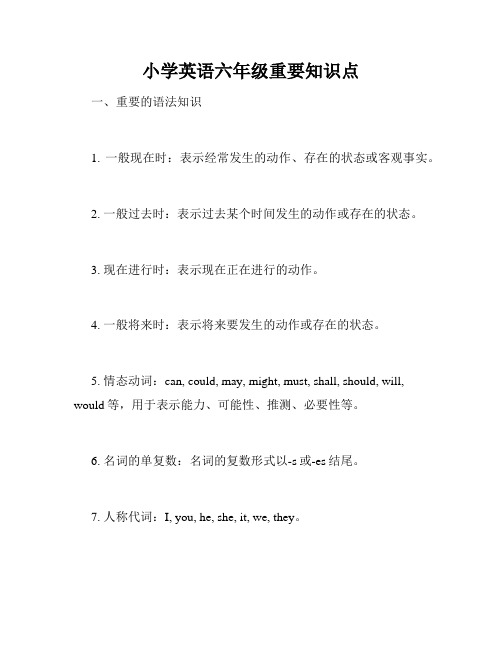
小学英语六年级重要知识点一、重要的语法知识1. 一般现在时:表示经常发生的动作、存在的状态或客观事实。
2. 一般过去时:表示过去某个时间发生的动作或存在的状态。
3. 现在进行时:表示现在正在进行的动作。
4. 一般将来时:表示将来要发生的动作或存在的状态。
5. 情态动词:can, could, may, might, must, shall, should, will, would等,用于表示能力、可能性、推测、必要性等。
6. 名词的单复数:名词的复数形式以-s或-es结尾。
7. 人称代词:I, you, he, she, it, we, they。
8. 形容词的比较级和最高级:通过在形容词前加-er和-est或者在前面加more和most来构成。
9. 反义词/近义词:表示相反意义或接近的词语。
二、重要的词汇和短语1. 数字:千、百、十等数字的读法及运算。
2. 季节和月份:spring, summer, autumn, winter;January, February, March, April, May, June, July, August, September, October, November, December。
3. 食物和饮料:apple, banana, milk, bread, rice, water等。
4. 动物:dog, cat, bird, fish, elephant, tiger, lion, giraffe等。
5. 家庭成员:father, mother, brother, sister, grandparents等。
6. 学科和学校设施:Chinese, English, math, science, school, library, classroom等。
三、重要的句型和对话1. 日常问候用语:如"How are you?" "What's your name?"等。
(完整版)小学六年级人教版英语总复习及知识点
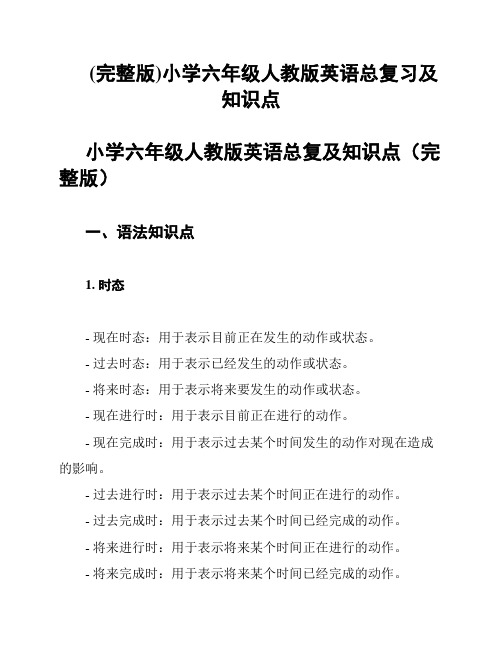
(完整版)小学六年级人教版英语总复习及知识点小学六年级人教版英语总复及知识点(完整版)一、语法知识点1. 时态- 现在时态:用于表示目前正在发生的动作或状态。
- 过去时态:用于表示已经发生的动作或状态。
- 将来时态:用于表示将来要发生的动作或状态。
- 现在进行时:用于表示目前正在进行的动作。
- 现在完成时:用于表示过去某个时间发生的动作对现在造成的影响。
- 过去进行时:用于表示过去某个时间正在进行的动作。
- 过去完成时:用于表示过去某个时间已经完成的动作。
- 将来进行时:用于表示将来某个时间正在进行的动作。
- 将来完成时:用于表示将来某个时间已经完成的动作。
2. 语法结构- 名词:用于表示人、动物、物体、地点等。
- 动词:用于表示动作或状态。
- 形容词:用于描述名词的特征或状态。
- 副词:用于修饰动词、形容词或其他副词。
- 介词:用于表示位置、时间或关系等。
- 代词:用于替代名词。
- 数词:用于表示数量。
- 冠词:用于限定名词的范围。
- 连词:用于连接词语、短语或句子。
3. 句子结构- 主语:句子中执行动作或承受动作的人或事物。
- 谓语:句子中说明主语动作或状态的部分。
- 宾语:句子中接受动作的人或事物。
- 定语:用于修饰名词或代词的成分。
- 状语:用于修饰动词、形容词、副词或整个句子的成分。
- 表语:用于说明主语的状态或特征的部分。
二、总复内容1. 单词- 请根据教材中的单词表,复并牢记相关的单词拼写和意思。
2. 句子- 复教材中的对话和句子,理解并掌握其基本意思和用法。
3. 对话- 复教材中的对话,掌握其中的日常生活用语和表达方式。
4. 语法- 复教材中的语法知识点,加深对时态、语法结构和句子成分的理解。
三、研究方法1. 多听多说- 多听英语教材、歌曲或英语广播,提高听力水平。
- 多说英语,练口语表达和语音准确性。
2. 多读多写- 多读英语教材、故事书等,提高阅读理解能力。
- 多写英语作文,锻炼自己的写作能力和语法运用。
六年级英语知识点汇总

六年级英语知识点汇总一、基础语法知识1. 词汇:掌握常用的词汇,包括名词、动词、形容词、副词等,并能正确运用。
2. 时态:掌握一般现在时、一般过去时、一般将来时等基本时态的构成和用法。
3. 句型:掌握肯定句、否定句、疑问句等基本句型的构成和转换。
4. 语法规则:了解并掌握一些基本的语法规则,如复数形式的构成、动词的变化规则等。
二、阅读理解1. 理解短文:能够读懂简短的英语短文,并理解其中的主要内容。
2. 根据短文回答问题:能够根据短文内容回答相关问题,培养阅读理解能力。
3. 阅读技巧:学会运用一些阅读技巧,如扫读、略读等,提高阅读效率。
三、写作能力1. 书面表达:能够用英语完成一些简单的书面表达,如写一封信、写一篇日记等。
2. 句子连接:学会使用一些连接词和连接词组,使句子之间的关系更加紧密。
3. 时态和语态:掌握时态和语态的正确使用,并能在写作中灵活运用。
四、口语交流1. 日常用语:掌握一些日常交流中常用的口语表达,如问候、道歉、感谢等。
2. 对话练习:通过对话练习,提高口语交流能力,培养听、说、读、写全面发展。
3. 发音准确:注意英语单词和句子的发音准确性,避免发音错误造成交流障碍。
五、语言文化1. 英语国家文化:了解和学习英语国家的一些文化习俗和传统,培养跨文化交际能力。
2. 名人故事:了解一些英语国家的名人故事,拓宽视野,增加语言背景知识。
六、听力训练1. 听力材料:听取各种形式的听力材料,如短对话、长对话、短文等。
2. 听力理解:通过听力训练,提高听力理解能力,能够听懂并理解日常生活中的英语对话和信息。
七、语言运用1. 语法练习:进行一些语法练习,巩固和提高语法知识的运用能力。
2. 词汇积累:进行词汇积累和记忆,增加词汇量,提高词汇运用能力。
3. 句型转换:练习句子转换,培养语言运用的灵活性。
八、考试技巧1. 考试准备:合理安排学习时间,掌握考试内容,提前进行复习准备。
2. 答题技巧:学会一些答题技巧,如排除法、关键词定位等,提高解题效率。
六年级英语必背知识点归纳
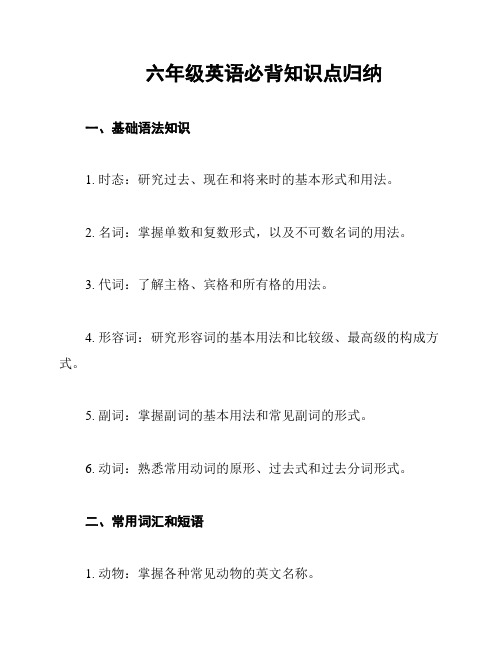
六年级英语必背知识点归纳一、基础语法知识1. 时态:研究过去、现在和将来时的基本形式和用法。
2. 名词:掌握单数和复数形式,以及不可数名词的用法。
3. 代词:了解主格、宾格和所有格的用法。
4. 形容词:研究形容词的基本用法和比较级、最高级的构成方式。
5. 副词:掌握副词的基本用法和常见副词的形式。
6. 动词:熟悉常用动词的原形、过去式和过去分词形式。
二、常用词汇和短语1. 动物:掌握各种常见动物的英文名称。
2. 食物:熟悉各种常见食物的英文名称。
3. 学校:了解学校里的各种地点和设施的英文表达。
4. 家庭:掌握家庭成员的英文称呼和家庭常用词汇。
5. 交通工具:熟悉常见交通工具的英文名称。
三、日常用语和常见句型1. 问候与介绍:掌握日常问候和自我介绍的常用表达。
2. 时间和日期:学会表达时间和日期的基本句型。
3. 祝福与道别:了解常见的祝福和道别用语。
4. 请求和应答:掌握常用的请求和应答句型。
5. 询问和回答:学会询问问题和回答问题的常用句型。
四、阅读理解1. 短文理解:通过阅读短文,理解其中的主要内容和细节。
2. 选择题理解:学会根据问题选择正确的答案。
3. 完形填空:通过选择正确的词语,填充短文中的空白部分。
4. 阅读技巧:掌握一些阅读理解的技巧和方法。
五、口语表达和听力理解1. 日常对话:通过模仿和练,掌握日常对话中的基本表达方式。
2. 听力训练:通过听力练,提高对英语的听力理解能力。
3. 总结归纳:将所学的知识点进行总结归纳,加深记忆。
以上是六年级英语必背知识点的主要内容归纳,希望能对你的研究有所帮助。
小学六年级英语总复习知识点总结
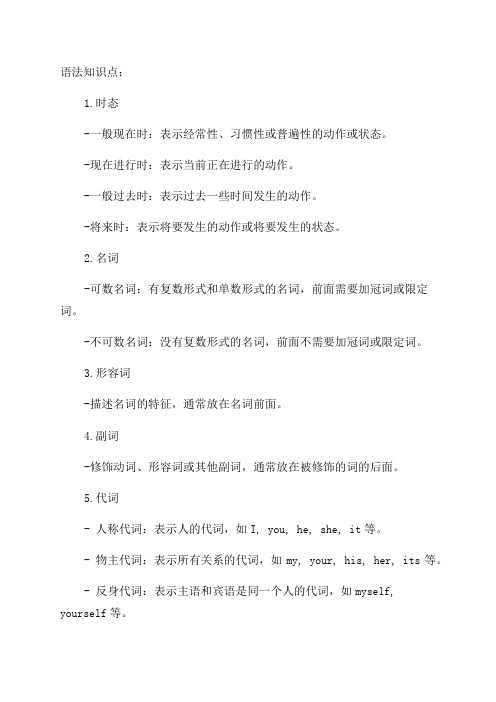
语法知识点:1.时态-一般现在时:表示经常性、习惯性或普遍性的动作或状态。
-现在进行时:表示当前正在进行的动作。
-一般过去时:表示过去一些时间发生的动作。
-将来时:表示将要发生的动作或将要发生的状态。
2.名词-可数名词:有复数形式和单数形式的名词,前面需要加冠词或限定词。
-不可数名词:没有复数形式的名词,前面不需要加冠词或限定词。
3.形容词-描述名词的特征,通常放在名词前面。
4.副词-修饰动词、形容词或其他副词,通常放在被修饰的词的后面。
5.代词- 人称代词:表示人的代词,如I, you, he, she, it等。
- 物主代词:表示所有关系的代词,如my, your, his, her, its等。
- 反身代词:表示主语和宾语是同一个人的代词,如myself, yourself等。
6.动词- 不规则动词:不遵循规则变化的动词,如be, have, do等。
7.冠词- 不定冠词:表示泛指,如a, an。
- 定冠词:表示特指,如the。
8.介词- 表示方位、时间、目的等关系的词,如in, on, at, to等。
词汇知识点:1.单词拼写-识别和拼写常见的英文单词。
2.同义词- 两个或多个意思相同或相近的词语,如happy和glad。
3.反义词- 意思相反的词语,如big和small。
4.情境词-根据给定的情境选择正确的词语。
5.词组- 相关词语组合形成的短语,如go to school。
阅读知识点:1.阅读理解-根据文章内容回答问题。
2.识别信息-根据关键词或句子找到文章中的相关信息。
3.推理判断-根据已有信息做出合理的判断。
写作知识点:1.书写规范-字母的大小写规范,标点符号的使用等。
2.书写格式-书写文章或信件时的格式要求,如开头、结尾等。
3.描写事物-描述事物的外貌、性格、能力等。
4.写作素材-如何搜集写作素材,使文章更加生动有趣。
口语知识点:1.日常用语-能够用英语正确地表达自己的意思。
2.对话练习-进行简单的对话练习,提高口语交流能力。
英语知识点归纳小学六年级

英语知识点归纳小学六年级一、动词时态1. 一般现在时:表示经常性或习惯性的动作,也可以表示客观真理。
2. 现在进行时:表示现阶段正在进行的动作。
3. 一般过去时:表示过去某个时间发生的动作或状态。
4. 过去进行时:表示过去某个时间正在进行的动作。
5. 一般将来时:表示将来某个时间会发生的动作。
6. 过去将来时:表示过去某个时间会发生的动作,通常用于叙述过去对未来的预测或计划。
二、名词形式1. 可数名词:表示可以数的事物,有单数和复数形式。
2. 不可数名词:表示无法具体数的事物,只有单数形式。
3. 可数名词的复数形式:根据规则变化,如在词尾加-s或-es。
4. 不可数名词的量化:使用量词或不定代词来表示数量。
三、形容词和副词1. 形容词:用于描述名词的特征或性质。
2. 副词:用于描述动词、形容词或副词的程度、方式、时间等。
四、介词的使用1. 方位介词:表示位置、方向等关系,如in、on、under等。
2. 时间介词:表示时间关系,如in、on、at等。
3. 方式介词:表示通过什么方式进行,如by、with等。
五、代词1. 主格代词:用于做主语的代词,如I、you、he等。
2. 宾格代词:用于做宾语的代词,如me、you、him等。
3. 物主代词:表示所有关系的代词,如my、your、his等。
六、连词和从句1. 并列连词:用于连接平行的词、短语或句子,如and、but等。
2. 时间连词:用于连接时间状语从句,如when、while等。
3. 条件连词:用于连接条件状语从句,如if、unless等。
七、比较级和最高级1. 比较级:用于表示两个事物之间的比较,一般在形容词或副词前加-er。
2. 最高级:用于表示三个或三个以上事物之间的比较,一般在形容词或副词前加-est。
八、疑问句和回答1. 一般疑问句:用于询问事实或情况,句首加助动词或be动词。
2. 特殊疑问句:用于询问具体信息,疑问词+一般疑问句结构。
六年级英语知识重点知识点

六年级英语知识重点知识点一、词汇1. 基础词汇:认识并正确拼写基础单词,包括常见名词、动词、形容词等。
2. 词组搭配:掌握常见的词组搭配,如动词短语、形容词短语等,能够正确运用。
二、语法1. 冠词:掌握a/an/the的用法,能够准确选择适当的冠词填空。
2. 时态:了解一般现在时、一般过去时和将来时的构成和用法,能够在句子中正确运用。
3. 代词:认识并正确使用人称代词、物主代词和反身代词。
4. 比较级与最高级:掌握形容词和副词的比较级和最高级形式,能够进行比较描述。
5. 句型转换:掌握肯定句、否定句、疑问句等基本句型的转换,能够进行简单句型变换。
三、阅读理解1. 短文阅读:能够读懂简短的英语短文,理解文章的大意和基本信息。
2. 阅读技巧:掌握一些阅读技巧,如根据关键词判断答案、根据上下文推断词义等。
四、口语表达1. 日常对话:能够进行简单的日常对话,包括问候、介绍自己、问询他人等。
2. 角色扮演:参与角色扮演活动,能够在特定情境中运用所学知识进行沟通。
五、写作能力1. 句子构建:能够用正确的语法结构构建简单的英语句子,表达自己的思想和意见。
2. 作文写作:通过模仿和创作,能够撰写一些简单的英语短文,如书信、日记等。
六、听力技巧1. 听懂指令:能够听懂老师的简单指令,如听懂做某项活动的步骤等。
2. 听懂对话:能够听懂简单的对话内容,理解对话中的基本信息。
以上就是六年级英语的重点知识点,通过学习和练习这些知识,相信大家的英语水平会有所提高。
希望大家在英语学习中能够坚持不懈,多进行口语和写作的练习,提升自己的英语表达能力。
祝大家学习进步!。
六年级英语重点知识总结
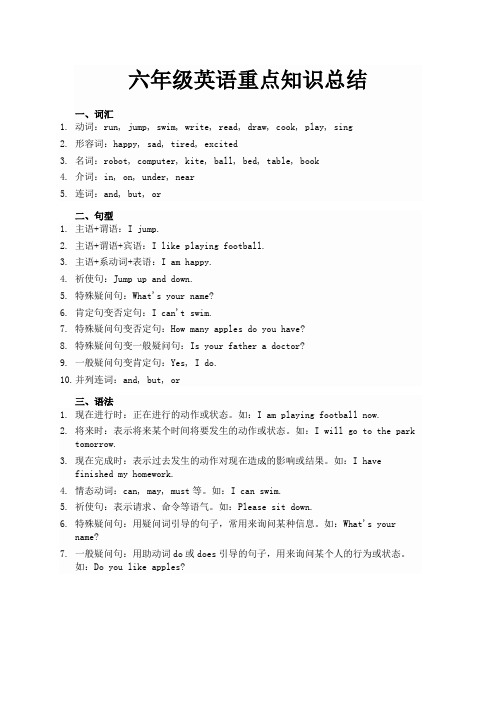
六年级英语重点知识总结一、词汇1.动词:run, jump, swim, write, read, draw, cook, play, sing2.形容词:happy, sad, tired, excited3.名词:robot, computer, kite, ball, bed, table, book4.介词:in, on, under, near5.连词:and, but, or二、句型1.主语+谓语:I jump.2.主语+谓语+宾语:I like playing football.3.主语+系动词+表语:I am happy.4.祈使句:Jump up and down.5.特殊疑问句:What's your name?6.肯定句变否定句:I can't swim.7.特殊疑问句变否定句:How many apples do you have?8.特殊疑问句变一般疑问句:Is your father a doctor?9.一般疑问句变肯定句:Yes, I do.10.并列连词:and, but, or三、语法1.现在进行时:正在进行的动作或状态。
如:I am playing football now.2.将来时:表示将来某个时间将要发生的动作或状态。
如:I will go to the parktomorrow.3.现在完成时:表示过去发生的动作对现在造成的影响或结果。
如:I havefinished my homework.4.情态动词:can, may, must等。
如:I can swim.5.祈使句:表示请求、命令等语气。
如:Please sit down.6.特殊疑问句:用疑问词引导的句子,常用来询问某种信息。
如:What's yourname?7.一般疑问句:用助动词do或does引导的句子,用来询问某个人的行为或状态。
如:Do you like apples?。
- 1、下载文档前请自行甄别文档内容的完整性,平台不提供额外的编辑、内容补充、找答案等附加服务。
- 2、"仅部分预览"的文档,不可在线预览部分如存在完整性等问题,可反馈申请退款(可完整预览的文档不适用该条件!)。
- 3、如文档侵犯您的权益,请联系客服反馈,我们会尽快为您处理(人工客服工作时间:9:00-18:30)。
复习(1)形容词和副词的比较级和最高级比较级:二者之间进行比较的叫比较级比较级结构••主语+谓语+形容词(副词)比较级+than+...表示“…比更…”最高级:三者或三者以上进行比较叫最高级最高级结构:主语+谓语+(the)+形容词/副词最高级+in/of短语表示“……是……中最……的(地)‘一、形容词、副词的比较级和最高级的变化规则一般单音节词,1.比较级在后面加-er,最高级在后面加-est如:small--smaller--smallest2.以不发音字母e结尾的,比较级在后面加-r,最高级在后面加-st: 如:large—larger —largest nice—nicer—nicest3.以一个元音和一个辅音结尾的重读闭音节单词.先双写末尾的辅音字母,比较级加-er,最高级加-est; big—bigger-biggest .以“辅音字母+y”结尾的单词,变y改为i,比较级加-er,最高级加-est;如:easy—easier一easiest busy—busier—busiest多音节单词和部分双音节单词的比较级是在单词前加more,最高级是在单词前加most beautiful—more beautiful—most beautiful形容词最高级前必须加定冠词the,副词最高级前加不加都行。
二、+规别变化good /well —better—bestbad/i11—worse—worstmuch/many—more—most little …less--leastfar----farther/further—farthest/furthest old—older/elder-oldest/eldest 越来越…单音节词:比较级and比较级多单节词•• more and more原形6.最高级中的of和in的区别of后面跟的是同类的人或事物,in后面跟地点或时间一、人称代词主格宾格形容词性物主代词名词性物主代词I我me我my我的mine我的you你you你your你的yours你的he他him他his他的his他的she她her 她her她的hers她的it它it它its它的its它的we我们us我们our我们的ours我们的you你们you你们your你们的yours你们的they 一them their theirs他她它们他她它们他她它们的他她它们的主格放在句首做主语,宾格放在句中,做宾语。
形容词性物主代词后面必须要有名词。
名词性物主代词后面不能有名词。
Be动词的用法:be动词有三种形式:am is are I用am, you用are, 用在he she it(包括人名和物名的单数)。
复数人称都用are。
复习(2)词形转换Wear(同音词)—where go on a trip(同义词组)…take a tripI’d (原形)—I would sad{反义词)一happyhot(反义词)—cold smart(同义词)_cleverwest(反义词)一east near(反义词)一farfast(反义词)一slow easy(反义词)一hardloud(反义词)一quiet dark{反义词)一brightalways{反义词}—never love(反义词)一hateheavy(反义词)—light last(反义词)nextill(反义词)—sick before(反义词)一aftergood{反义词)一bad have{三单)一haswell(反义词)—badly—ill loud(反义词)—loudlyquiet(反义词)一active below(反义词)一above do(三单)—does noise(形容词)—noisy sun(形容词}_sunnycloud(形容词)一cloudy wind{形容词)一windy sea(同音词)一see worry{形容词)一worried rain(形容词}—rainy on (反义词)一under snow(形容词)—snowy laugh(反义词)—cry up(反义词)一down will not(缩写)won't know (同音词)一no also(三单)—too look like(同义词)be like easy{反义词)一hard/ difficultpeople(复数)people America(形容词)—Americandifferent(反义词)—same in front of(反义词)—behindsudden (副词)—suddenly happy(同义词)一pleasedIeft(反义词)一right far(反义词)—near behind(反义词)—in front of in (反义词)一out next to (近义词)—beside Italian(名词)—Italy cross{名词)一crossing here (对应词)—thereinterest(形容词)—interesting ask(反义词)—answertasty(同义词)—delicious …yummy----niceright(同音词)write child(复数)—childrenlarge(近义词)—big (反义词)—smallbookstore(近义词)—bookshop early(反义词)—latethere(同音词)一their people(复数)一peoplekid(同义词)—child wear(同音词)—wherecome(现在分词)—coming before(反义词)—afterdrive(名词)一driver go(反义词)一comedifferent(反义词)一same fast{反义词)一slownumber(缩写)一No. right{反义词)一wrongslow(副词)—slowly stop(反义词)—goMr.(对应词)—Mrs. red(对应词} —greenfoot(复数)—feet by(同音词)—buy/byedidn't {完全形式)—did not hobby(三单)—hobbiesdance(现在分词)— dancing don't(三单)—doesn'tthose(对应词)—these have(三单) —hastrue(反义词)—false China(形容词)—Chinesedish(复数)—dishes gift(同义词)—presentfisherman(对应词)一fisher woman country(复数)—countries businessman—businesswoman she’ll(原形)—she willdrive(名词)—driver clean—cleanerwrite(名词)—writer sing(名词)—singerdance(名词)—dancer work(名词)—workerplay(名词)—p layer see(同音词)—seahealth{形容词)一healthy fish(复数)一一fish(条数)—fishes(种类)lots of(同义词)— a lot of this(对应词)—thatpeople(复数)—people(人)—peoples(民族)this(复数)—these these(对应词)—thosethat(复数)—those quick(副词)—quicklycoach(复数)一coaches near(反义词)—farfast(近义词)—quick/quickly businessman(复数)——businessmen fisherman(复数)—fishermen postman(复数)——postmen fisherwoman(复数)—fisherwomen unusual(反义词)—usual usual(副词)一usually does not(缩写)一doesn’till(近义词)一sick will not(缩写)—won'tgood(反义词)一bad happy(反义词)—sadwrong(反义词)一right hear(同音词)一heretall (反义词)一short worry(形容词)—worriedsuggest(名词)一s uggestion ill{反义词)一well/finebreath(动词)一breathe anger(形容词)—angryplay(名词)一player teach (名词)一teacher friend(形容词}…friendlyfun(形容词)---- funny young(反义词)--- old he lp(形容词)---- helpful strict(反义词)----kind real (副词)——reallyIt’s(完全形式)——it is do not(缩写形式)----don'tsleep(形容词)---sleepy I’ll(完全形式) ——I willweekend(对应词)——weekday would like(同义词)——w a n t doesn’t(完余形式)——does not drink(对应词)——eatI'd like(完全形式)——I would like health{形容词)——healthylet’s(完全形式)——let us up(反义词)——downleaf(复数)一leaves s wim(现在分词)一swimminglots of(同义词)——many, much have to(近义词)——must dictionary (复数)——dictionaries diary(复数)——diariesstory(复数)——stories teach(反义词)——learnhalf(复数)——halves forget(反义词)——rememberbe going to (同义词)——will learn{同义词)——studyteacher(名词)——teacher hard(反义词)——easytrip(同义词)——travel with(反义词)——withoutsome(同义词)——any can’t (完全形式)——can notforget(反义词)—remember next(对应词)——last Wonderful(同义词)—great can’ t(完全形式)—can notHow about you?(同义句)……What about you?two(同音词)---- too/to silly(反义词)----cleverHere(反义词)---- there in(反义词)----outTasty(同义词)----delicious teach(对应词)----learncome(对应词)----- go fish (复数)----fish/fishesrat(同义词)---- mouse big(反义词)----small / littlein front of(反义词)----behind over / on(反义词)----underabove(反义词)---- below lots of(同义词)-----many/muchwe!l(同乂词)----good move(过去式)----moveddirty(反义词)----clean old(反义词)----new / youngtheir(同音词)---- there bike(同义词)----bicyclePicture(同义词) photo pretty(同义词)----beautifulsad(反义词)---- happy people(复数)----peopleTall(反义词}----short black饭义词)----whitebuild(名词)----building start(反义词)----finishlate(反义词)----early get up{反义词)----go to bedfun{形容词)----funny also(同义词)----too by(同音词)----bye/buy last(反义词)----next after(反义词)…beforemeet(同音词)----meat paint (同义词)=drawnation{形容词)--national pretty(同义词)----beautifulplan(动名词)---planning cold (反义词)----hot warm(反义词)------cool never (反义词)----always beautiful (同义词)=prettyautumn (同义词)==fall vacation (同义词)=holidayGood job!(同义词)==Good work leaf(复数)----leavesWhat’s your favourite season?(同义句)Which season do you like best? What’s the weather like today?(同义句)——How is the weather today? go(过去分词)…gone hi(同音词)-high that’s(完全形式)-that is their(同音词)---there love{形容词}---l ovely deer(同音词)--dearof course(同义词)-sure diary(复数)---diaries meat(同音词)--meet open(反义词)一close practice (名词)-practise(动词)thin(反义词)—fat it’s(完全形式)-it is fast{反义词)--slowopen{反义词)一closed who名词所有格)—whosenoise(形容词)一no i sy well(形容词)—good paint(名词)—painting delicious(同义词)-tasty hungry{反义词)一fullwho's(完全形式)---who is little(反义词)一big little(同义词) small quiet(副词)---quietly teach(名词)——teacherCanada(形容词) Canadian Spain(形容词)Spanishright(反义词)—l eft right(反义词)一wrong wear(同音词)where周一至周六Sunday--- Sun. Monday---Mon. Tuesday---Tues.Wednesday ---Wed. Thursday---Thur. Friday---FriSaturday---Sat.-月至十二月January—Jan. February-Feb. March-Mar.April-Apr. May June-Jun. July-Jul. August-Aug. September—Sep./ Sept. October—Oct.November—Nov. December Dec.复习(3)短语1.Show sb sth或show sth to sb给某人看某东西或把某东西$某人看"2.Talk to sb.和某人说话3.play with…和某人一起玩4.knockoff 把…撞下来5.be good at sth./doing 擅长…6.from…to…从…到…7.be afraid of害怕….8.. be angry with sb 对…很生气9.wait for 等待10.What’s wrong with sb =What’s the matter with sb11.be ready for sth , be ready to do sth 为…做好准备12.be on上映13.go over复习,仔细检查14.enjoy doinglove to do like doing/to do 喜欢做某事15.What happened to sb?某人发生什么事16.be far from 离.....很远17.It’s time to do sth . It's time for sth 到做某事的时间了18.lt’ s time for sb to dosth到某人做某事的时间 19.It takes sb some time to do sth做某事花费某人多长时间20.lt’ s easy to do sth做某事很容易21.be different什om与…不同the same as与…相同22worry about = be worried about 为…担心、/着急23.be interested in…对什么感兴趣 24.ta1kabout谈论关于某事25.talk with和某人交谈26.Chat with和......聊天27.share sth with sb 和…分享28.give sb sth给某人某东西 give sth to sb把某东西给某人29.get sth from sb收到某人送的某物30.get to+地点名词注意:get home get there get here3l.on one’ s left/right在某人的左边或右边32.turn left/right at +地点在某处向左拐或右拐33.try to do sth.试着做某事34.helpsb. do sth. h elp sb with sth 帮助某人做某事35.want to do sth.想要做某事36.have to不得不,必须。
